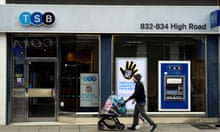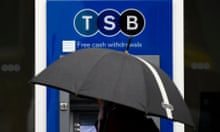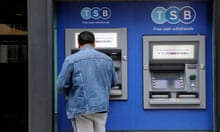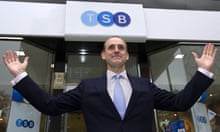The City regulator has launched a stinging attack on the chief executive of TSB over the bank’s failure to be open and transparent with customers when an IT upgrade went badly wrong, locking as many as 1.9 million customers out of their accounts.
The Financial Conduct Authority accused Paul Pester of “portraying an optimistic view” of services after the botched operation in April that is still causing disruption for customers more than a month on.
“The FCA has been dissatisfied with TSB’s communications with its customers and we have had concerns that TSB was not being open and transparent about the issues experienced,” Andrew Bailey, the FCA’s chief executive, said in a letter to the Commons Treasury committee.
“[T]he current communications were perceived as poor, and could reduce trust in TSB and in the banking sector as a whole.”
The City regulator’s damning assessment increased the pressure on Pester as he prepared to make a second appearance in front of the Treasury committee on Wednesday.
In a critical assessment of Pester’s personal handling of the IT meltdown, Bailey also suggested that the TSB boss might have been more forthcoming with MPs on the Treasury Committee when he gave evidence on 2 May. Bailey said at the time of the hearing Pester may have had information from tech experts at IBM who had been drafted in to help cope with the meltdown.
“We are … concerned that at the time of the committee hearing, the CEO may have been in possession of an initial set of slides by IBM which provided initial views on the incident, and could therefore have shared more detail on this with the committee.”
Bailey highlighted TSB’s claim that “the vast majority” of customers were able to access their online accounts at a time when there was a successful first-time login rate of only 50%.
The FCA has the power to fine TSB over the incident and said it was investigating the crisis jointly with the Prudential Regulation Authority. The system failure happened when TSB transferred customer records to a new IT platform.
Noting the extraordinary nature of the situation, Bailey said: “We do not normally make this information public, but given the level of public interest, I want to be clear that we will be conducting this work.” He said Pester and the TSB board were accountable for the decision to press ahead with the systems upgrade.
Responding to Bailey’s comments, Nicky Morgan, chair of the Treasury committee, said she was deeply concerned by TSB’s failings.
“The regulator does not make such criticisms lightly. I am deeply concerned by TSB’s poor communications about the scale and nature of the problems it has faced; by its response to customer fraud; and by the quality and accuracy of the oral and written evidence provided by Dr Pester to the committee.
“The committee will discuss Mr Bailey’s letter, and the ongoing problems faced by TSB customers, when it sees Dr Pester and other TSB board members, as well as the FCA, on Wednesday.”
A spokeswoman for TSB said the bank continued to keep customers updated on its latest service status. She added: “We will be updating the Treasury select committee [on Wednesday] and will continue to fully support its inquiry.
“In the meantime, we continue to focus on doing whatever it takes to put things right for our customers, and ensuring that no customer will be left out of pocket as a result of the recent IT issues.”
During his first encounter with MPs, Pester was accused by Morgan of being “extraordinarily complacent” after he said the bank’s move to the new IT system had mostly run smoothly.
Up to 1.9 million online and mobile banking customers at TSB began experiencing problems with their accounts on Monday 23 April after the bank – now owned by Spanish lender Sabadell – migrated from an IT system inherited from the previous owner, Lloyds Banking Group.
However, some TSB customers are still facing disruption to services more than a month after the IT chaos began. The FCA said as recently as 30 May, when Bailey wrote to Morgan, phone customers were still being forced to wait more than 30 minutes to be connected to an agent, while customers were hanging up or being disconnected on more than 40% of calls.
Bailey also said that the risk and scale of customer fraud had increased since the migration, and that TSB had failed to meet regulatory requirements of refunding all affected customers “as soon as practicable and in any event by the end of the business day after the day which it became aware of the fraud”.
The FCA said “operational challenges” still persisted in some TSB bank branches.









